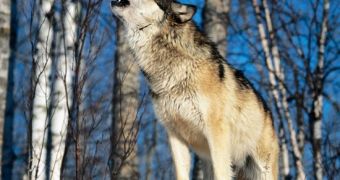Wildlife researchers at Austria's Wolf Science Center have found that, as surprising as this may sound, wolves don't howl because they really get a kick out of spooking people and other creatures they share their territories with.
The researchers argue that, quite often, these predators howl to show how much they care about other members of the pack.
Therefore, it can be argued that whatever variations in howling behavior have been recorded over the years are not a reflection of the animals' emotional states, but of social relationships established within different packs, EurekAlert informs us.
To test the theory that wolves howl not because they are stressed, but to maintain contact with their close “buddies,” the specialists carried out several experiments.
What they did was take wolves belonging to the same pack out for individual – and rather long – walkies.
While each of these wolves was enjoying its walk, the researchers monitored the howling behavior and the cortisol (i.e. a stress hormone) levels of the pack's remaining members.
It was thus discovered that each animal howled more when a wolf it was particularly close to was away. What's more, the entire pack let out some really impressive howls when dominant specimens were out of sight.
“Our data suggest that howling is not a simple stress response to being separated from close associates but instead may be used more flexibly to maintain contact and perhaps to aid in reuniting with allies,” researcher Friederike Range commented on the outcome of this series of experiments.
“Our results suggest the social relationship can explain more of the variation we see in howling behavior than the emotional state of the wolf. This suggests that wolves, to a certain extent, may be able to use their vocalizations in a flexible way,” he went on to say.
A detailed account of this investigation and its findings was published in yesterday's issue of the journal Current Biology.

 14 DAY TRIAL //
14 DAY TRIAL //